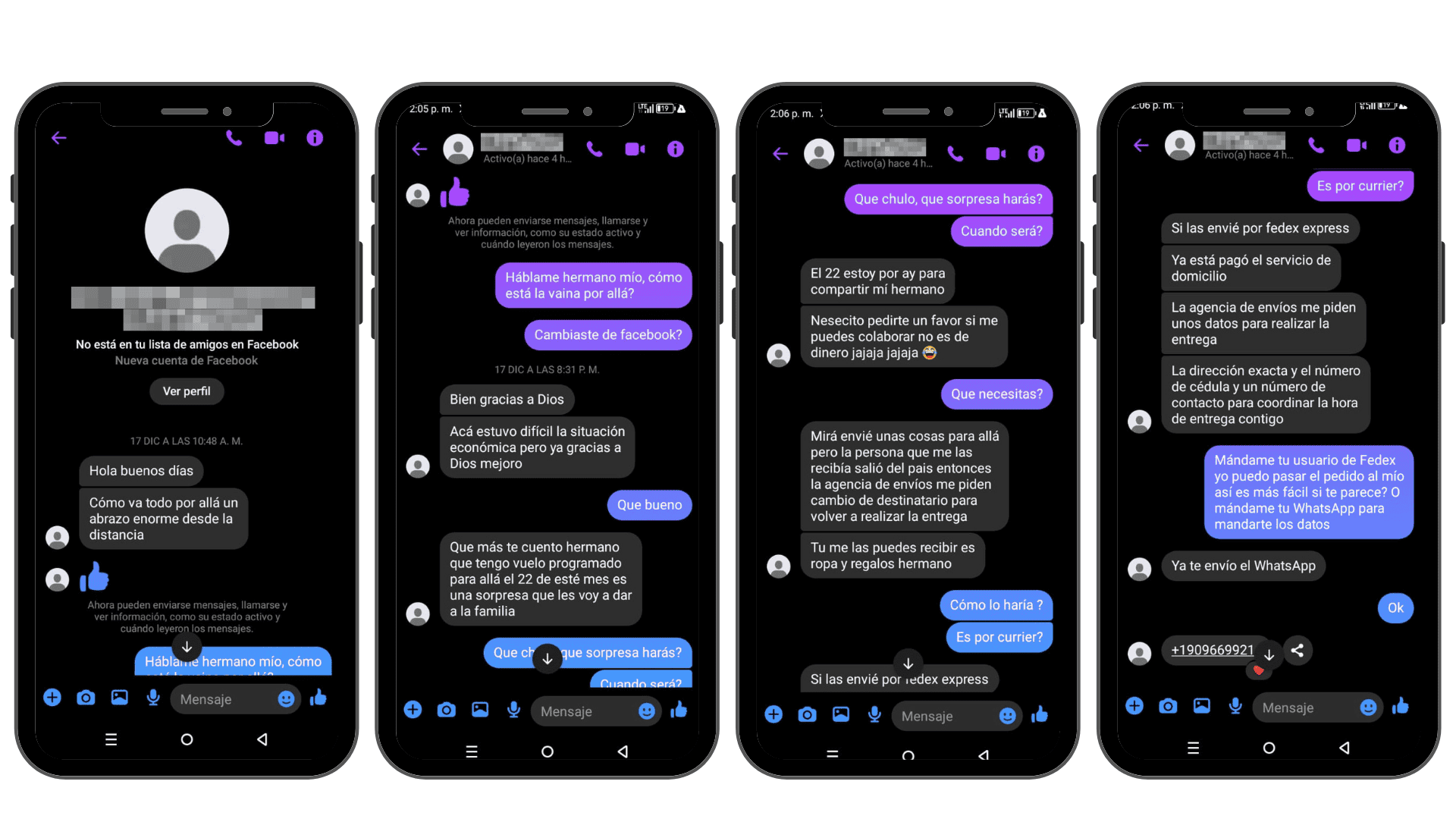
The crimes cyber They are increasingly common in the Dominican Republic. From fraudulent links to steal data to spoofing identity in networks social To deceive third parties, criminals use various methods to obtain money.
These crimes affect both individuals and companies, with many scams that exceed the million of pesos. According to the High-Tech Crime and Crime Investigation Department (Dicat), more than 1,500 complaints are received monthly, between 40 and 50 a day.
Here is a case of usurpation of identity in Facebookwhere the scammers They tried to fool the list friends of a victim to pay money under the pretext of being a tax issue to receive supposed packages sent from abroad.
The modus operandi of scammers
Criminals begin by identifying a Facebook public, where they can access the photos of the profile already the list of friends. Then, they create a fake account using the victim’s first and last name. This profile restrict its content only to those friends accept the request, allowing scammers remain hidden while they continue to collect information.
Once the fake account is created, the scammers send friend requests to friends from the victim and, through direct messages on Messenger, they claim to be out of the country and ask for help to receive packages that, they say, would be a gift for their family.
The scam case in detail
Since December 17, Diario Libre closely followed the interaction of one of the friends of the victim of usurpation of identity with the swindler who posed as that person with the profile fake in Facebook.
After chatting via Messenger the swindler requested one of the friends of the victim his name, address and ID to send the packages.
To continue the conversation, friend of the victim provided the requested data via a WhatsApp number provided by the swindler.

He swindlerwhich used a phone number with area code +1 (909), corresponding to the western part of San Bernardino County in California, USA, sent photos of the alleged packages and an altered invoice issued in Paris, France , with the data provided by the friend.
Then, he said that the next day a representative of the agency shipments of packages would be contacted to coordinate delivery.
Blackmail: Pay or face consequences?
On December 18, the friend of the victim of usurpation of identity received a message from another WhatsApp number with the area code +1 (332), corresponding to New York from a person who identified himself as Alberto Jacome Cortés, coordinator of shipments from the parcel agency.
According to Jacome Cortés, he communicated from warehouse 77, hangar 21 of the José Francisco Peña Gómez International Airport of Las Américas, to coordinate the delivery of the packages and indicated that the General Directorate of Customs had retained the shipments for “tax evasion.”
In his messages and in a call telephone that was left engravedstated that the packages would be released only if the amount of 240,750 Dominican pesos was paid that same day.
When analyzing the call that was recorded, it was identified that the alleged coordinator of shipments had a foreign accent and during the conversation he did a kind of live editing that made it seem like he was doing the call from a station call center.
After the call with the assumption coordinator of shipmentshe profile fake of the victim wrote to WhatsApp “friend” to inform you that you received an email notifying you of the status of the packages in the country and their retention.
He profile fake He reiterated the amount that had to be paid to the “friend“and explained that he had the money to make the payment, but that he could not make it from abroad, so he asked for his help so that the “friend“He will pay it under the promise that he would return the money when he returned to the country.
In trying to extend the conversation and see how far the swindler that usurped the identity. He “friend“He explained to him that he did not have that amount of money. Then the swindler He revealed that supposedly an acquaintance of his in the General Directorate of Customs could make moves to reduce the payment to 50%, for which he would only have to pay about 120,375 Dominican pesos.
The insistence: pressure to pay
He profile fake that usurped the identity insisted that payment had to be made the same day and that therefore the “friend“She had to try to find the money, since he would return it to her when he returned from his trip.
Subsequently the assumption coordinator of shipments of the agency got back in touch and called “friend” to say that the payment platform was having problems, but that it would send the payment method within an hour.
After several interactions, the supposed coordinator of shipments provided a bank account to make payment through Western Union. However, the friend The victim explained that he could not make the payment and requested other bank accounts, but national ones to transfer the money.
On December 19, the scammers They continued to apply pressure, providing two national bank accounts. Despite insistence, the money was never sent.
On December 20, the coordinator The parcel company sent a final message to reiterate that, if the payment was not made, the “friend“would be involved in a legal problem and the profile fake He also told the “friend“that the package he sent contained two laptops with 100 thousand dollars each, which increased the seriousness of the situation.
Finally, the friend of the victim left the conversations unseen, and the scammers They did not contact him again.
The scam
Although he friend of the victim was not scammed, this case demonstrates how criminals use sophisticated techniques to gain the trust of their victims and get money. Thanks to their collaboration, valuable information was collected about the bank accounts used by the scammerswhich can serve as a warning to other potentially affected people. The lesson is clear: it is essential to be alert to this type of fraud and know how to identify them to avoid being a victim of this type of deception.
What does the law say about this type of crime?
Although the scam did not materialize, there is a crime, which is the heist of identity for the purpose of defrauding and falsifying documents.
He heist of identitythe scam and the falsification of documents Digital crimes are crimes classified in Law 53-07 on High Technology Crimes and Offenses.
Article 15.- Scam. The scam carried out through the use of electronic, computer, telematic or telecommunications means, will be punished with a penalty of three months to seven years in prison and a fine of ten to five hundred times the minimum wage.
Article 17.- Identity Theft. The fact of a person using a identity outside yours, through electronic, computer, telematic or telecommunications means, will be punished with sentences of three months to seven years in prison and a fine of two to two hundred times the minimum wage.
How to report a cyber crime?
If you are a victim of a crime cyberas scamdefamation, bank fraud or child pornography, you can report it in one of the prosecutors specialized in high crimes technologyaccording to Law 53-07.
To do so, go to the prosecutor’s office or make the report online through the official portal of the National Police at In both cases, be sure to bring proof of the crime and your identification document. identity.
More information about the locations of specialized prosecutors’ offices is available at https://www.instagram.com/p/Cl02EiGLn9B/
Tips to Protect your Social Networks
-
Set your accounts to private mode: In Facebook and Instagram, restrict access to your content only to friends and known followers.
-
Don’t accept suspicious friend requests: always check the identity of people before adding them.
-
Enable privacy options on WhatsApp: Restrict who can see your photo profile and description.
-
Report fake profiles: If someone creates an account with your name and photos, report it to the social network immediately.
Preventive measures if I have been a victim
If you have already been a victim of usurpation of identityit is essential
-
Report the profile fake to the social network.
-
Inform your friends about the situation.
-
Report to the competent authorities.



